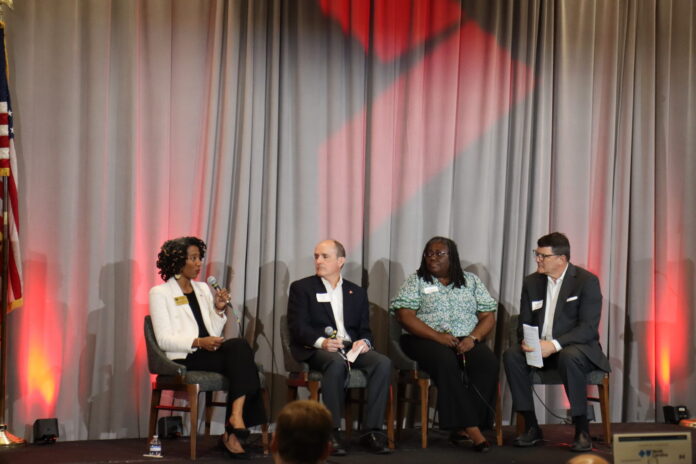Business, government, and health care leaders from across North Carolina gathered in Durham on May 13, 2025, to learn about the landscape of the state’s mental health crisis and strategies to address it at the NC Chamber’s first Business Summit on Mental Health.
Presented in partnership with Blue Cross and Blue Shield of North Carolina, the summit focused on highlighting the role of mental health in shaping businesses, communities, and the workforce.
According to presenters, the day-long summit was also the first of its kind presented by the NC Chamber that was uniquely focused on mental health. Leaders realized the urgent need to recognize the state’s workforce and students’ mental health crisis, which the COVID-19 pandemic only accelerated and brought further into light.
May is also mental health awareness month, making the summit a timely example of how state leaders can normalize conversations on mental wellbeing.
“The reason this event is focused on mental health is that we were doing a health care conference every year for a while, and it kept surfacing as a key component of what we were doing,” said Gary Salamido, President and CEO of the NC Chamber. “It was always part of the plan, but it was something that we all dealt with, it was something we all could agree on going forward. And so we said, ‘Why not put a focus on it?’ And so we’re here today to do that.”

The summit made clear that a discussion about North Carolinians’ health must include the status of its young people’s mental health.
Part of the understanding of this youth mental health crisis comes from the North Carolina Department of Public Instruction’s (DPI) Youth Risk Behavior Survey. Conducted in the spring of every odd year, the most recent results from 2023 showed that 39% of North Carolina high schoolers reported feeling sad or hopeless almost every day for at least two weeks during the last 12 months.
Jai Kumar, CaroNova’s executive vice president, shared during a panel on promising practices for solutions to the crisis that while these numbers are down from 2021, in the last 10 years, the statistics have unfortunately increased: In 2013, only 29% of high schoolers reported these feelings.
“Our young people are feeling more hopeless and feeling as though adults do not care about them as much as they used to,” said Kumar. “And we do have an opportunity in this room as leaders to really think about it. And so as we think about our opportunity and we think about this crisis escalating, I think it’s thinking about us as adults, first and foremost, and what are the actions we are taking in order to show that we are supporting our young people in our everyday lives?”
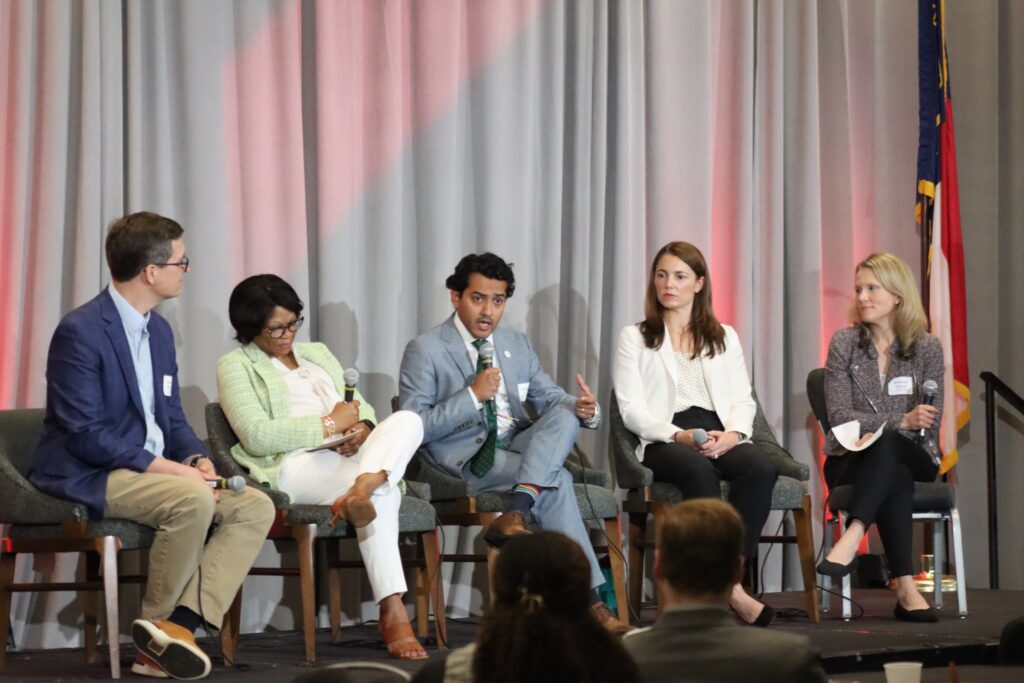
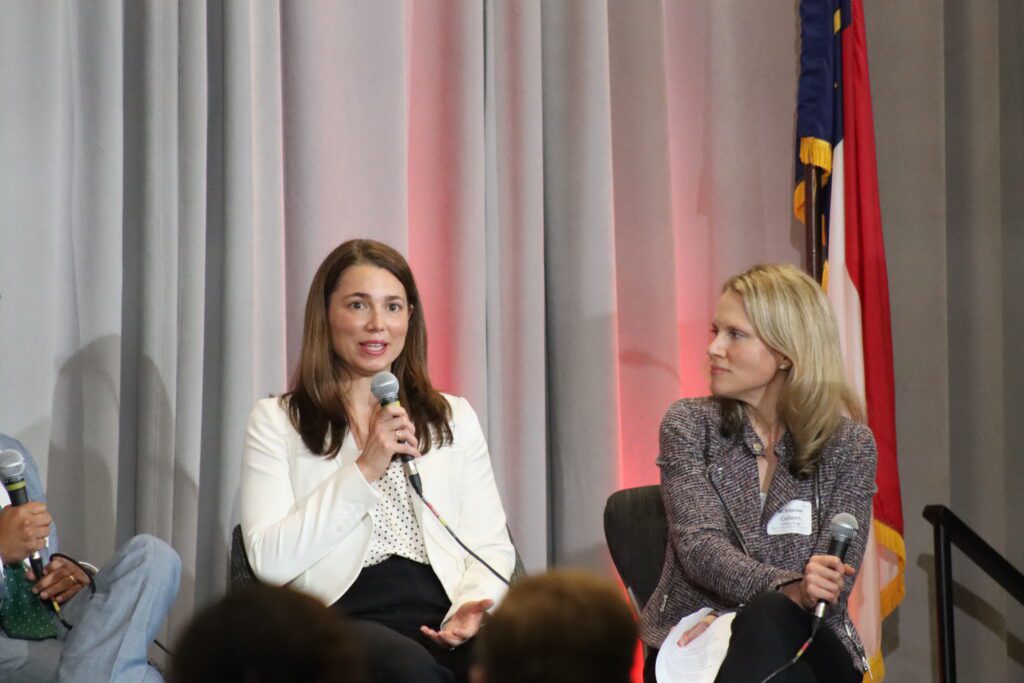
In addition to a personal responsibility to uplift the state’s young people, Dr. Sarah Y. Vinson, the summit’s keynote speaker, emphasized in her presentation that part of the response must be recognizing that many existing policies on both state and federal levels do not not meet young people’s needs.
Vinson is a professor and chair of psychiatry and pediatrics at Morehouse School of Medicine and a certified psychiatrist in adult, child and adolescent, and forensic psychiatry.
“When we talk about the child’s caregiver, I would argue that it’s so much bigger than a family,” she said. “It’s the schools, it’s child welfare, it’s the people making decisions about the lived environments that youth’s developing brains are growing up in.”
To illustrate how policies can systemically impact youth mental health, Vinson pointed to facts like the child poverty rate being higher than the national rate, billions of dollars being disinvested from public schools at state levels in the last 10 years, and United States’ ranking among the bottom countries in terms of annual public spending per child on early childhood care — all of which can lead to and exacerbate mental illnesses.
“So when we talk about the youth mental health crisis in this country, we can’t disentangle that from the investments we make in the youth’s primary support system,” Vinson said.
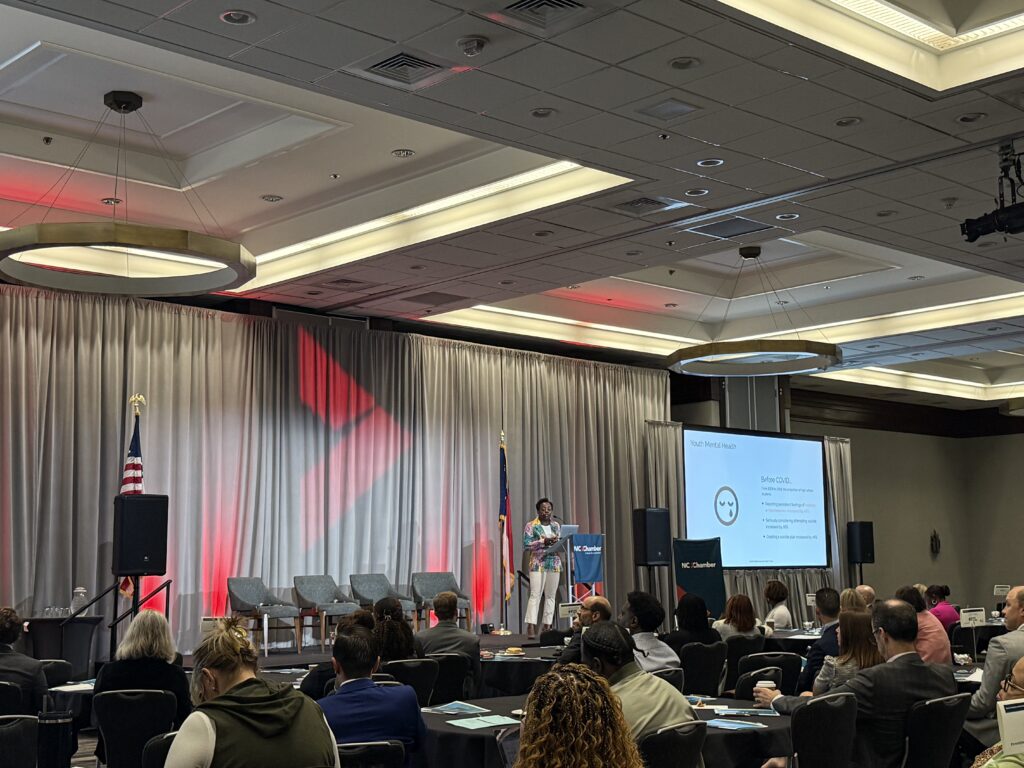
Youth mental health also impacts the future of the state’s workforce.
Elizabeth DeKonty, director of the N.C. Resilience and Learning Project at the Public School Forum of NC, pointed out that when young people’s basic psychological needs aren’t met or supported, students cannot show up and be their best selves in either school or work environments.
“We have to think about how are we addressing those physical health needs, but also those mental and emotional wellbeing needs in order to support the newest generation that’s entering the workforce, who’s experiencing and living in the youth mental health crisis, to be their best selves when they’re entering the workforce for the first time,” said DeKonty.
DeKonty referenced DPI’s Portrait of a Graduate as a helpful framework to integrate this support into students’ lives. The Portrait of a Graduate outlines seven key life skills DPI wants every graduating student to take with them into college or the workforce and includes skills like communication, critical thinking, empathy, and adaptability.
Schools can proactively embed and teach these socioemotional learning and life skills in students’ day-to-day lives, DeKonty said.
Integrating these skills into schools and children’s lives will take time, but is a necessary approach to sustainably address students’ holistic wellbeing — making sure they’re ready academically, socially, and emotionally to lead successful lives, she said.
“It’s a marathon, not a sprint,” said DeKonty.
Presenters also emphasized that employers and business leaders don’t have to wait for the new generation to enter the workforce to begin to address mental health needs. Many shared ways they lead by example when it comes to workplace wellbeing.
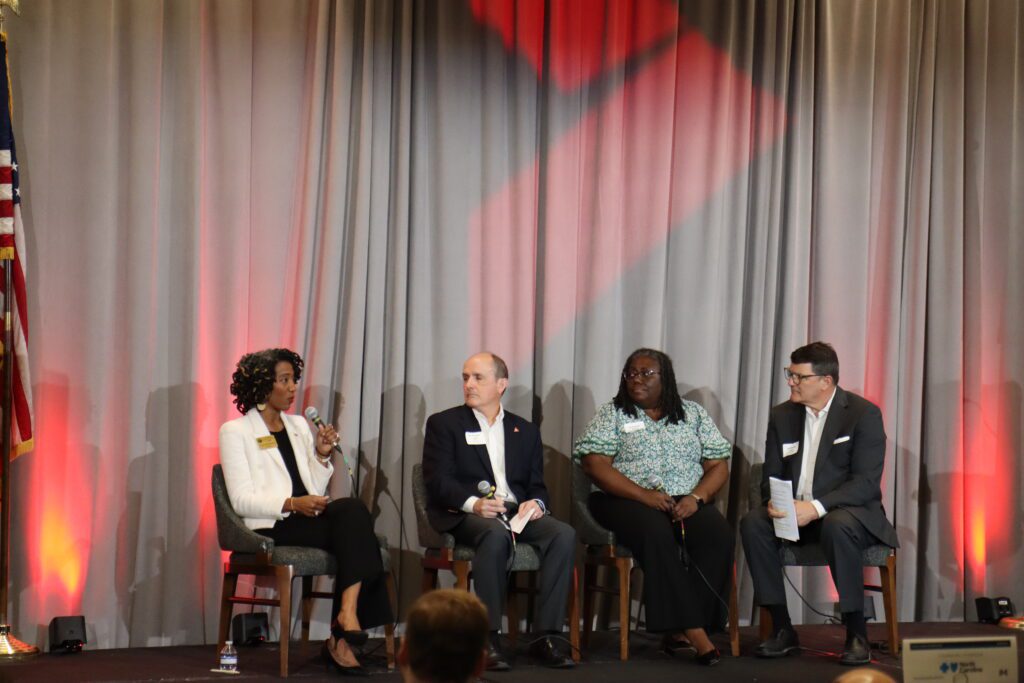
Jocelyn Mitnaul Mallette, secretary of the North Carolina Department of Military and Veterans Affairs, for example, shared that she takes two minutes every day when she arrives in her office to practice mindfulness before beginning the work day. Salamido reflected on his decision to attend his son’s basic training graduation when the event overlapped with a Chamber board meeting. And the summit’s closing speaker, Emmy Award-winning television and sports presenter Jay Glazer, shared his personal experiences with mental illness diagnoses and the life-saving decisions he made to publicly share his journey and create support systems with families and friends.
Beyond these day-to-day practices, though, leaders can be involved in more systemic change by examining, for example, how formal operational or HR policies in their workplaces might contribute to employees’ wellbeing.
“Recognize your power,” said Dr. Christoph Diasio, a pediatrician at Sandhills Pediatrics. “You have the option as an employer to talk about this both from a belief pulpit standpoint and potentially from a financial standpoint.”
Students and business leaders alike share a basic need for environments and policies that protect their wellbeing, and the future of the state’s students and workforce depends on whether its residents get to experience these environments in their classrooms and workplaces.
“Everyone is on a spectrum between mental health and mental illness, and everyone can go up or down that spectrum depending on their protective factors, their supports, their adaptive coping, and that balance with that counterbalance of their risk factors, their stressors, and their maladaptive coping,” Vinson said. “And so it’s not just about diagnoses and billing codes and things that we often focus on in medicine, but it’s really about how people’s thoughts, feelings, and behaviors are either getting in their way and causing them distress or positioning them to succeed and pursue the life that they want.”


